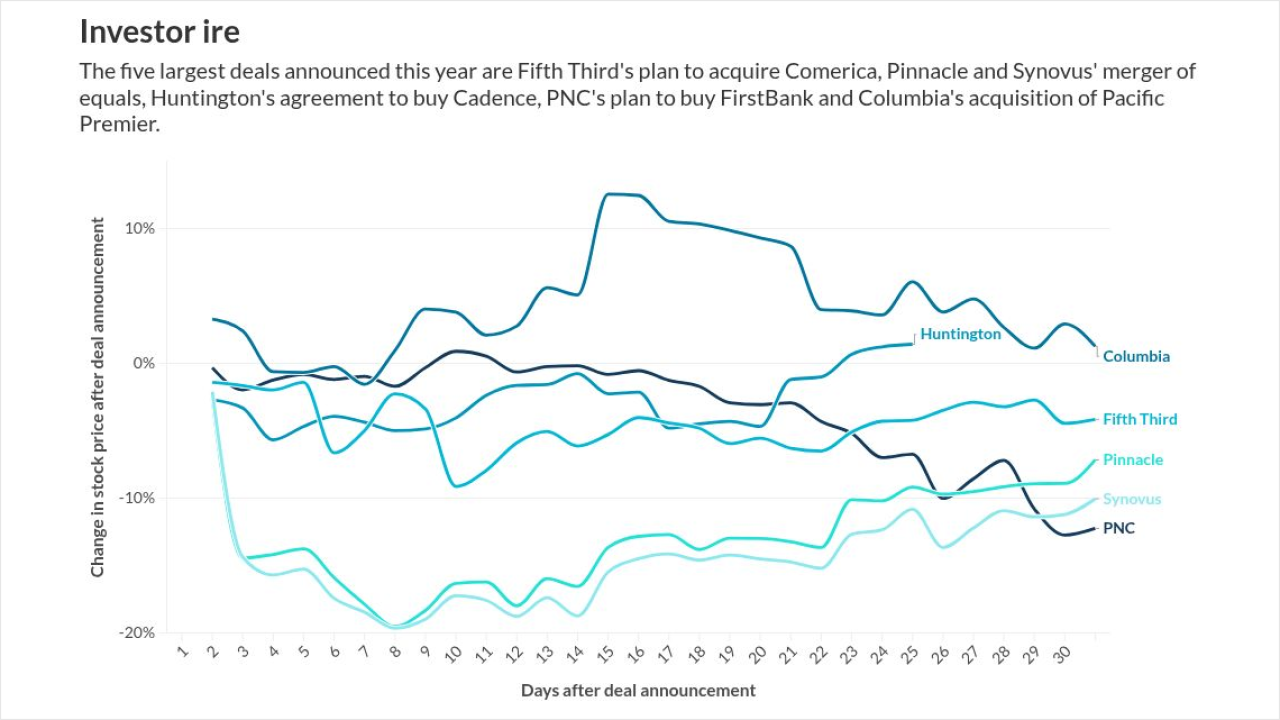Bonnie Lee's career in banking is nearly as long as that of the bank she runs.
Intrigued by her first experience with banking when her parents applied for a loan to buy a small fruit and vegetable business, Lee, then in her mid-20s, applied for a management-trainee program at a Korean bank. She was hired as one of just three new joiners out of some 50 applicants, she recalled. That was in the 1980s; she's since worked for a dozen CEOs, she said.
In New York City to ring the bell at the Nasdaq to celebrate the bank's 40th anniversary, Lee spoke with American Banker about running a minority depository institution, how community banking is and isn't changing, and what her clients are asking for now. The interview has been edited lightly for clarity and space.
What is it like to run an MDI right now?
BONNIE LEE: Hanmi has been designated as an MDI for many years. And it's really rewarding to be a MDI institution. Most of the customers that we have are small businesses, and just comparing small business to the corporate type of customer base, they have limited resources. That's where community banks, like Hanmi, as an MDI institution, we can really support them and then kind of help hand-hold them. A good example would be in the [Paycheck Protection Program] days.
How much did you do in PPP?
We did close to about 4,400 [loans]. In the first round we did about 3,000. The second round we did over 1300. I think we are the only, within our marketplace, the only bank to actually put an ad in the paper, inviting not only our own customers, but inviting the business community, because I know that small businesses really do not have the resources or the information sources. So we put an ad and within a couple of hours, we were just bombarded with all the questions and we just had customers actually sign up for PPP, not only our customers but other banks' customers. Through that process we were able to put on, actually, a really good customer base from other banks, because I think the way I was gauging that some of the banks were kind of, they have to get involved. And yet they don't want to get involved. Meaning they were not very active. They're very passive.
Some of [the new companies] became our customers, but some of them had a relationship where the banks were not entertaining the PPP, or they couldn't get through to them. So if they were using the big banks, applied online and then you don't hear from them, and then they got very anxious, and then they called us.
And then later on, they relaxed, but the first time around, the government has given pretty much 7 to 10 days for us to fund, from application to fund, and that's where the rush came in. It's almost like the Titanic, hanging on. So some of them became our customers. Actually, a couple of our VIP customers are actually from other banks, other creditors.
Your bank started out for the Korean community and then it's expanded to other ethnic groups. So how does that break down?
Currently, I would say about 70% of our customers in California are still based out of the Korean community and then the rest of that 30% is probably non-Korean. Outside of California, though, the ratio is the other way around. It's actually 30% Korean and the rest of them are other ethnic groups or the typical kind of neighborhood customers.
How are things different for community banking now that COVID is sort of over?
We are still in COVID. So we still have challenges. I think the current environment has rising interest rates, and inflation or the much-talked-about recession. I think that, even when I look at our business clearly, and my customer base, you know, they were very resilient. They survived COVID. But being in this environment, whether U.S. or globally, I think uncertainty gets created. So because of the uncertainty, I think that in terms of a customer, if they had an expansion plan, it's kind of a wait and see. I do think that some of them are still cautiously optimistic in terms of the business opportunities or the expansions, but I think it's more pocketed. It depends on what type of the industry and then the size of the industry and maybe even the certain geographical area. So I think it kind of varies, but overall it's the uncertainty that's created by the environment.
Which industries or verticals seem to be doing better now?
I think overall, in terms of the corporate side, the manufacturing side, they are very strong. We have our customer base and what we call the U.S. KC Initiative, the Corporate Korea Initiative. It's a very strong sector. We continue to see the investment coming into the United States and continue to see the expansion plans, but in terms of just the small-business sector in general, because of the rise in interest rates, thus far, they've been going up pretty well. But we just have to see: the rise in the labor cost, and then depending on certain sectors, the talent, challenges for recruiting that talent for various companies.
How do you think about talent?
I'm really focused on growing talent, because the banking business is a people business. I always believed that having the right people is a key to success for any organization.
What I heard was, people leave their jobs, not because of the company, but 60% of the people leave because of their immediate boss. That's consistent. That's why the key strategy for Hanmi is communication. So in our CEO's message, every quarter I deliver the CEO's message, in terms of performance and what you should be focused on in the next coming quarters and all that. And then communication up and down is critical, because whatever I communicate down, our executives, employees are at the mercy of your own direct boss. So if they don't communicate what's going on in the bank, at the same time, they don't really know what's going on from the bottom up. It's really difficult for you to assess, so that's why I like to go out and meet branch folks, because they are the ones that really interact with customers day to day.
So how did you get your start? What made you into a banker?
I'm probably the only banker on both my mom and my dad's side. I grew up in Chicago, and my parents, due to weather conditions in Chicago, decided to move out to California in the late 1980s. And then when they landed in California, they were looking for a business and they actually bought a business. And then like many immigrant families, they had to go to the community bank to get financing. My parents were in wholesale fruits and vegetables. So when we were purchasing that we had to go meet a banker, and, you know, first-generation Korean parents and they didn't know American banking, so to speak. At that time I was probably 27, 26. I accompanied my parents who met the banker in town. My parents got the financing.
And then right after that, I saw there was an advertisement from one of the Korean banks. advertising for a management trainee position. So I applied and then they asked me to come in for an interview and then at the time they were doing the interviewing like it was a Korean corporate. There's four or five executive managers, all men of course. There was one woman. This is a woman that actually really inspired me and she's now CEO of a company. So they did an interview, and an English writing test. I was one of the three that got picked, I think out of over 50, 60 And that's how I literally started. And I worked with about a dozen CEOs. All of them were my teachers, in the sense that I learned from them. Their success, and I learned from their failures. That's why everybody's a teacher.
Were any of them women?
Actually, one of them was a woman. And she's still the CEO of another Korean American bank.
What are some experiences that influenced you when you were coming up as a banker?
My CEO at the time really preached the corporate culture. He says that "Free people govern themselves." We as human beings have a tendency to to behave better when we think others are looking. His message is, whether somebody is looking or not, you do what you need to do. And then in order to be free within yourself as a professional, you personally need to manage yourself.
And there's another CEO ... who said, whichever position that you are in, operate like it's your own business. You're not just the department manager, you're the manager, you are the CEO, and then make the decisions.
Are you going to be doing any more expansion?
We still have, setting aside California, Texas, Illinois, the Eastern region, there are some emerging markets, particularly in the Georgia area, and then also relative to our California operation, our Eastern region operation is still just pockets. So if we were to geographically expand, those would be the areas.
And then we have products and services for treasury management, which is a big contributor to our success in the U.S. KC business, because corporate customers hardly show up in the branches. We have multiple teams that service these corporate customers, and the team is a lender, and the deposit specialist, and then treasury management. So there's a three member team that we market to our corporate customers, as well as we provide the services for them and continue that relationship. Our corporate customers, sometimes their revenues are over $100 million.
And these are companies that are doing business between the U.S. and Korea?
So the mother company is in Korea, obviously, and they have their U.S. operation in the United States. And sometimes they have their regional headquarters and manufacturing plants. When we first started this business, I was targeting more of the auto-parts companies that support Hyundai and Kia. But the industry of these Korean companies are so broad-based now: entertainment, education, K-beauty, even some of the real estate investments that they made. So they're mostly continuing or going into mainstream U.S. business and industries.
When did you start this business line?
This is our third year.
What other initiatives are you doing?
Last year we built our residential mortgage platform and we brought in an executive and he built the team. So last year was the one full year operation. Obviously, the whole industry has slowed down. But the first three quarters of the year, the results were quite strong. I think it's going to continue to contribute about 15% of our production business. And then we have a small equipment financing and leasing division that continues to do well.
Like a lot of communities, Koreatown in Los Angeles, it's evolving. Hanmi Bank was the first truly the first Korean American bank founded in the United States and it was founded for local businessmen and women. There was a need as a first immigrant, you know, they're mostly in small businesses and it was tough to go into mainstream banking and try to get financing right. Language is a challenge. So that's why the deep ties that we have within the Korean community, and now it's not just Korean communities, as I said, outside of California, it's other ethnicities, a lot of them are in the minority population. So that's where we are targeted, the market truly expanded, and we're going to continue to diversify our customer base as well as the business as well as our true geographical presence.







